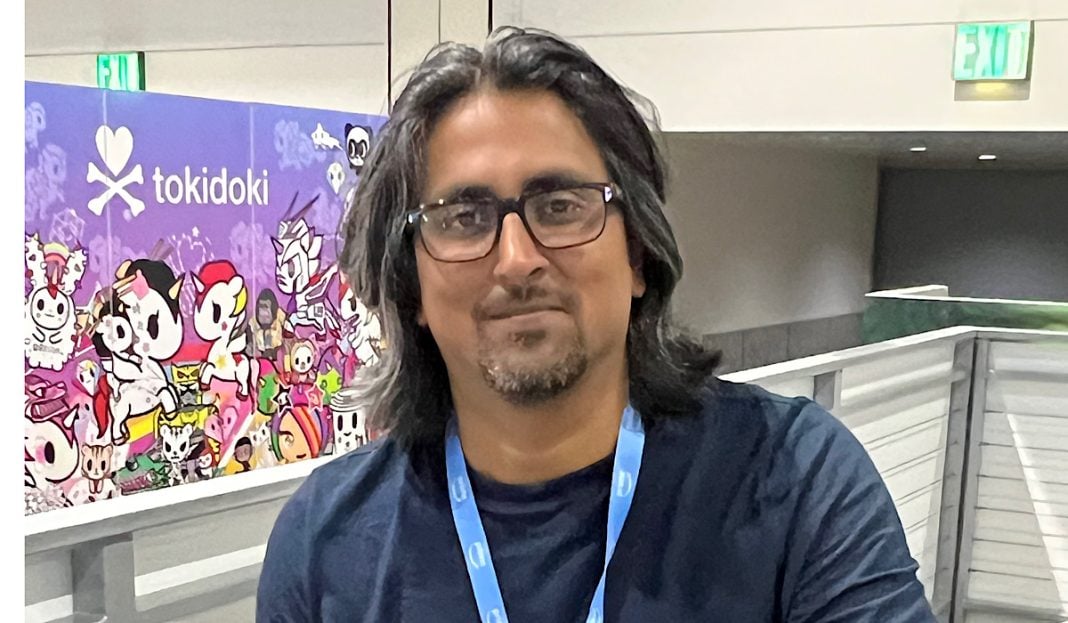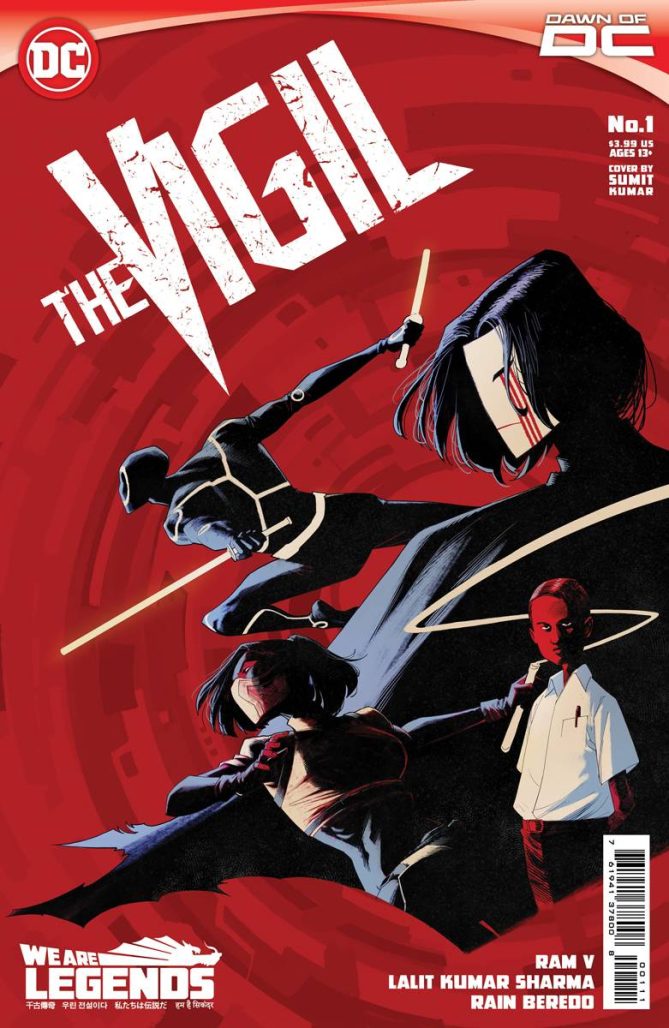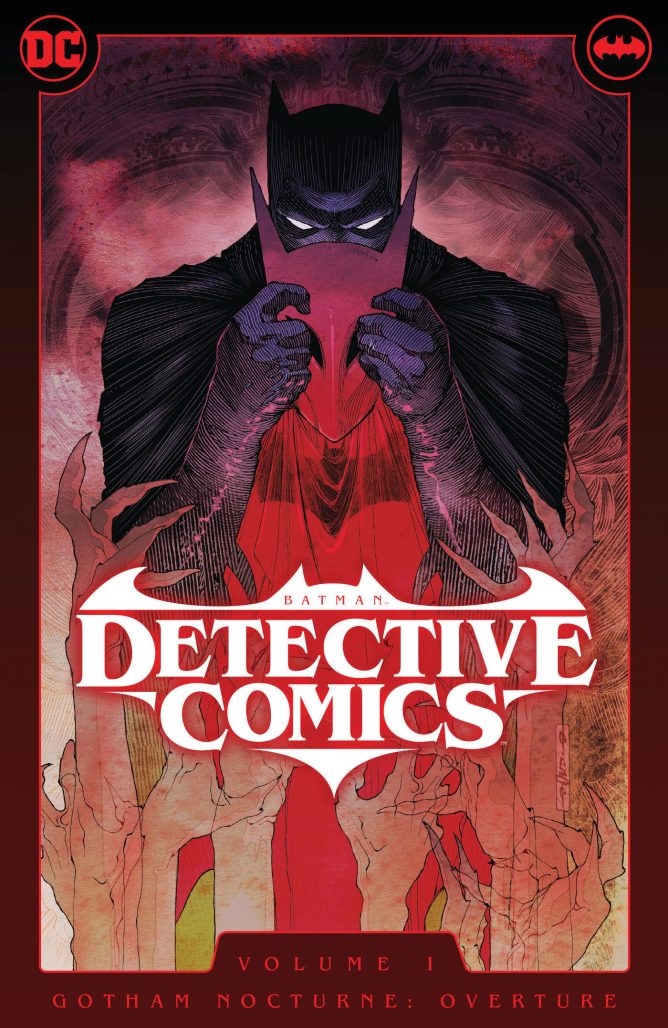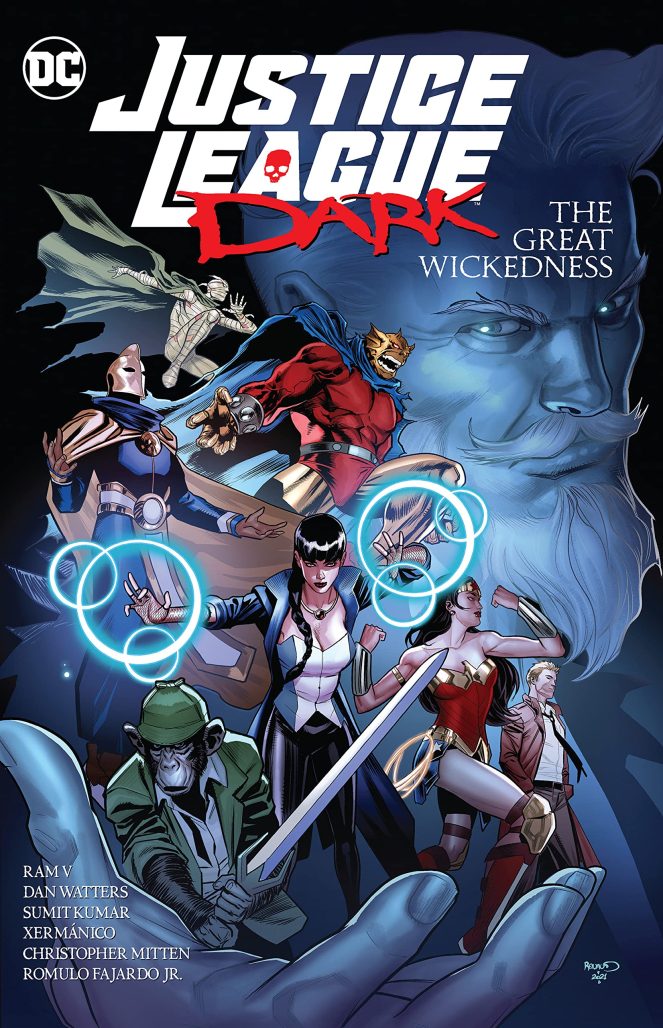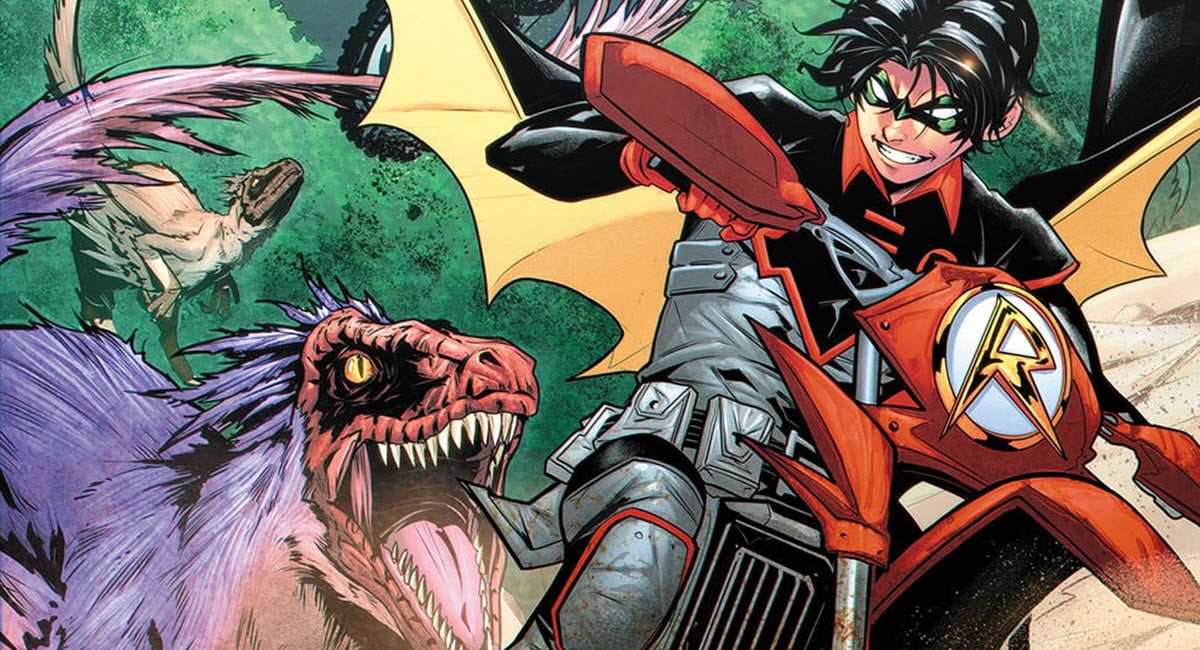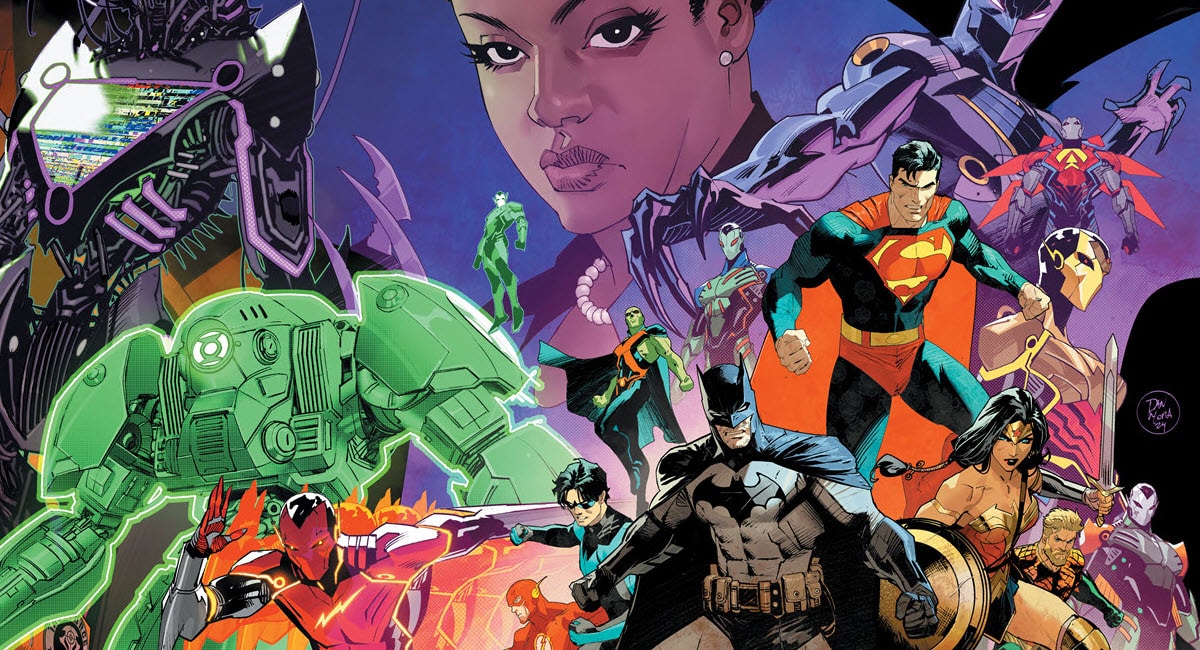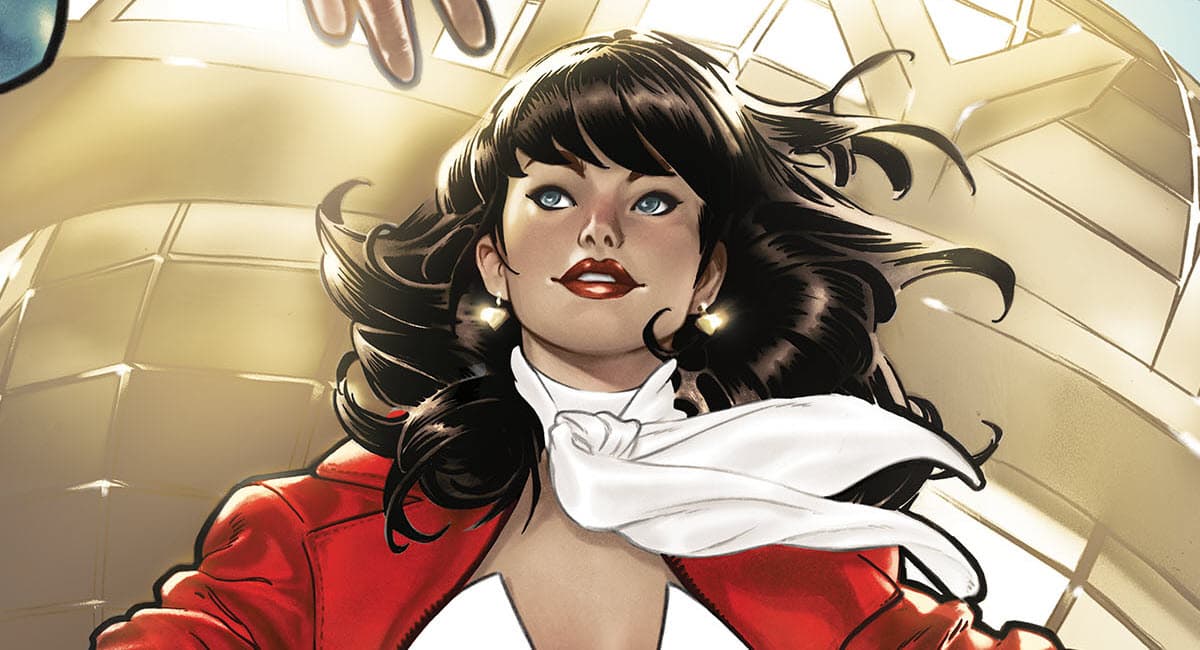At Comic Con Eisner-nominated and award-winning writer Ram Venkatesan, better known as Ram V (The Many Deaths of Laila Starr, The Swamp Thing) had quite an eventful Comic Con in San Diego. Ram V was there to promote his latest DC projects, including The Vigil with Lalit Kumar Sharma, as well as the next storyline for Detective Comics, a Western-themed arc that will feature Dustin Nguyen (Ascender, Descender) and Jason Shawn Alexander (Gotham Central) on art. Also announced at DC’s Gotham City Panel at the con was V’s two-year exclusive deal with DC.
During the convention, The Beat caught up with Ram V to talk about his current books, what to anticipate, and what he hopes to take on in the next two years as he continues to break barriers in the DC superhero world.
Nancy Powell: You came from a science background and now you’re doing full time comics. What has that been like?
Ram V: I did come from a science background. I feel like I use a lot of the same things. I learned to be inquisitive. I learned to be organized. And I think the engineering background ingrains a level of perseverance in you, which I think is very useful when you’re a writer, to have the discipline to sit down every day. So, I use a lot of that. I was never really interested in chemical engineering stuff. I did it because I came from an orthodox Indian family, and my father was a chemical engineer.
I had always been interested in storytelling. I wrote my first ever story when I was about 12, and it was 40,000 words long. I’d always had the inclination to write since I was a kid, and it’s just great to be doing something that doesn’t really feel like work.
Powell: You still bring a lot of science into your comics writing.
V: I just didn’t enjoy the work, but I love science. I love delving into scientific theory and a lot of that is the same sort of creative thinking that you use in any other creative medium. And I do bring that sort of creative inquisitiveness and a creative lateral thinking, if you will, to writing comics as well. One of my pet peeves is when there’s a good sci-fi story that doesn’t have a basis in science, so you’re always left, at least in my mind, struggling to suspend that part of my disbelief. It’s quite useful to be able to write something and go like, ‘No, I can frame plausible science behind this.’
Powell: If I were to go see a big screen adaptation of one of your superheroes, I would totally believe in it because the science made sense.
V: I mean, they’re superheroes, but I would give you enough reason to suspend your disbelief.
Powell: So, let’s talk about The Vigil. The first two issues are out, and you’ve already explored the background of Arclight as well as a bit about the other players. Will you delve into their backgrounds as the book progresses?
V: Issue 3 is out now as well. And we look at Saya in issue 3. And so I think that is the structure and format that I’m following for [issues] two, three, four, and five, looking at individual characters, and then six kind of brings it all together again. I found that to be a really nice structure, especially for an opening arc that’s supposed to introduce the team to people. But I also find it very inelegant when people introduce the team to you at the very beginning, and it almost feels a little inorganic, and I wanted to do it in an organic way.
Powell: Now with The Vigil, we get a team of Indian superheroes. They are unlike anything that I’ve experienced in DC. What is different or alike about the traditional superhero from Indian superheroes?
V: I wouldn’t presume to talk about all superheroes that existed before. But certainly, my canonical reading of superheroes was largely American. And I think the fundamental difference is between societal or cultural takes on the ideas of good and bad, right and wrong. I feel like America has very defined ideas, a very line-drawn-in the-sand idea of good and bad, right and wrong, even though they are entirely subjective ideas. That’s why some of the problems that exist today exist, because there are fundamental differences between what we think is good and bad on multiple sides of the divide.
Whereas in a place like India, you can’t afford to have that kind of black-and-white ideology because you’re 1.2 billion people crammed into a country smaller than Texas. We have to coexist with people that believe entirely different things compared to you. So, you live in the gray. You don’t live in black and white. I found it very interesting to write characters that aren’t necessarily superheroes and superhumans. Humans live in the gray. Heroes don’t live in black or white.
Powell: And then with Arclight, you see that playing out in the background. He’s got this black-and-white view of things, but you can also see good, for example, with the child that he was trying to talk out of doing this big, bad thing.
V: And yet he electrocutes the whole battalion of people as soon as he steps outside. So he is simultaneously both black and white, and therefore it’s almost like he believes he is in a position where he has to exist in the gray but not everybody else has to do that. Not everyone else has to encounter the same thing he did. And I think that is broken, but also heroic.
Powell: As far as your work on Detective Comics goes, what did you learn from previous Batman runs that you could take and change up in your style?
V: Well, the thing I learned from a lot of previous Batman runs, and also my canonical first introduction to Batman, was the animated series. I took a lot from the animated series. And I realized that the reason I loved watching or reading Batman was the drama, the gothic overtones, this sense of tragedy about everything. And I was a little surprised to read the contemporary comics and go like, ‘Okay, this doesn’t really focus on that kind of Batman.’ It’s more gadgetry and cool Batmobiles and cool new tech and suits and all of that. And I said, ‘Okay, that Batman exists. Let me do a Batman that doesn’t exist like that.’ And so, when I was asked what I would do on Detective, I said I want to do a big operatic, melodramatic Batman story. And so that was very much my motivation behind doing the story.
The other thing I learned in my analysis of Batman as a societal participant is he’s very much part of the fabric of Gotham. Part of this design, you might say, is I couldn’t quite tell if he was still a vigilante or he had become part of the city, part of the system. I quite liked the idea of Batman as a vigilante. He should be a vigilante, in which case, you cannot be part of the system, you cannot become part of what the city is. And so, my endeavor has been to envision, even if from a villainous point of view, a Gotham without Batman and then find a way for Batman to say ‘No, I’m important to the city, and I have to exist and I still have a role to play,’ And in some ways, envision a new role for Batman within Gotham. And we’ll see that play out over the course of the books.
Powell: It all goes out into that black and white and gray area with superheroes
V: I mean, I think a vigilante especially has to be black and white. If a vigilante starts becoming gray, then you’re not really a vigilante because you’re willing to compromise your ideals, which are meant to challenge the system, if you will, and the system being more than the tools of oppression in the human society, usually being gigantic, enormous systems. It’s almost impossible to combat them without being a black or white character.
It’s why when we hold up examples of people who have defeated systems, we always think black and white characters. Gandhi, for example, deciding that, okay, you can be as violent as you want towards me, and I will never respond with violence. Or the man standing in front of the tank at Tiananmen Square. These are black-and-white examples, and I think a vigilante must always hold a black-and-white example.
Powell: Of the DC characters that you have written, which has been your favorite and why?
V: That I’ve written…so we’re going to have to go all the way back to my Justice League Dark line. I do quite like writing that magic corner of the DCU, but also it’s a very difficult question to answer with any measure of truth, because all of the books that I’ve written I’ve written because I wanted to write them, and so I kind of love all the characters that I’ve written so far.
Powell: Which character or which book would you like to tackle next if you had the choice?
V: I do have the choice, and they are pitches that are with DC editors at the moment so I’m not sure I can talk about that yet.
Powell: That’s fair.
V: I will say this one character that I am not pitching on right now that I would like to write is Martian Manhunter. I think perennially an underutilized character that I could do interesting things with.
Powell: So, DC has taken a bigger punch by its willingness to engage Asian writers. What has that meant to you as an Asian writer?
V: I wouldn’t frame it like that. I don’t think there is an option like if you are going to craft stories, whether it be DC or any other publisher, you cannot intend to grow your readership and not engage with the world as it is today. And the world as it is today is, we glance just two feet past the edge of this railing and you will find white people, Black people, Asians, Europeans all around this con floor. How then can you create a world that is one and not the other? And so, I think the future is in absolutely engaging with the diversity that is prevalent in the world around us. If anything, I’m very happy that the worlds that these comics exist in are moving towards worlds that are recognizable by all of us today. This is the place I live in. And people who are like me can be heroes. People who are like me can be villains. And so, I think that is an important thing for any creator, but more importantly, any reader to feel, because I didn’t have that when I was growing up.
While I don’t quite agree with the idea that they’re willing to take this plunge, I think it’s inevitable. But I also have to say that I’m very happy to see that The Vigil is a part of “We Are Legends,” which is the AAPI initiative in DC. And it wouldn’t have happened if it wasn’t for the single-minded sort of push of Jessica Chen. It was the editor who had the idea in the first place. Without further effort, it wouldn’t have been possible, and it’s great to see that kind of single-minded push towards creating these comics and characters.
Powell: There has been more of a three-dimensional view of what it means to be Asian existing in society today. I think that in comics in the past Asian characters were there but just kind of background characters.
V: Yeah, but I also feel like that’s a natural thing. I was asked this at a different convention, in different towns. Someone had once asked me how I felt about diversity hires or diversity and characters that weren’t really written well or weren’t fleshed out or were there because of some kind of tokenism. And to be very honest, I’m a very patient person. I think that all change happens over time. And it begins in some place, and if it has to begin with the inclusion of characters who are terribly written to the cardboard cutout, so be it. But at least there is an intention to move in the right direction. And eventually it leads to things like this where, you know, I’m the first Indian to have written Batman. I’m the first Indian to create Indian characters in a superhero universe. So, it’s moving in the right direction and long may continue. And there will be a million mistakes and a million badly-written characters along the way, but it’s still a step in the right direction.
Powell: I think you’re taking a great step and the characters are just wonderful. So far at the Con, what have you noticed or seen that has interested you the most?
V: Well, I mean, I think the talk in the town obviously is the SAG-AFTRA strike and the fact that there isn’t a huge Hall H line waiting outside by the Bayfront anymore. But it’s kind of nice to see. I know there were a lot of doubts about whether people would show up, and it’s been great. The convention floor is as insufferably crowded as it always is. And it’s great to see that people are turning out for comics, people are turning out for the characters and the worlds that they love. I do hope the strikes get resolved. I do hope writers and artists and actors get what is fairly due to them. But it’s nice to see people here for comics in the meantime.
Powell: One final question, and that is what books are currently on your bookshelf and what are you looking forward to reading?
V: I’m currently reading a Murakami two-part novel, Pinball and something else. I’m a big Murakami fan. I haven’t read comics in a while. I find myself going back to that. I just finished rereading Into the White Sea by James Dickey, which is researching something else that I’m writing later this year. In terms of comics, I just finished reading It’s Lonely at the Centre of the Earth. Zoe Thorogood is brilliant and amazing. And just caught up with Tom King‘s work on The Brave and the Bold as well. So yeah, that’s what I’m currently reading. What’s on my shelf are there are too many, way too many books on my shelf. Way too many unread books on my shelf.
Powell: But that’s good.
V: Yeah, you know, I keep forgetting the word but apparently there’s a word in Japanese for the condition where you buy books and read them. I certainly suffer from it.
Miss any of our earlier SDCC ’23 coverage? Find it all here!


